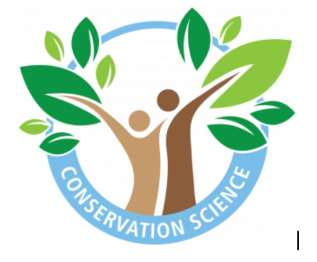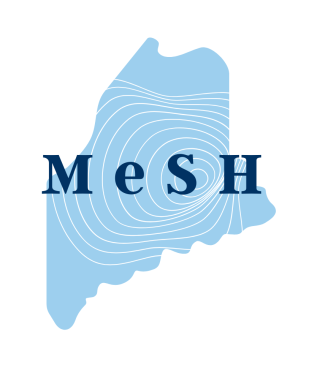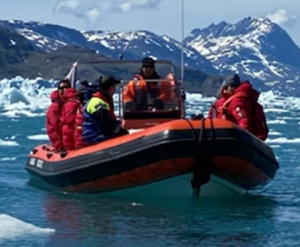NRT: Enhancing Conservation Science
NRT represents the National Science Foundation Research Traineeship, a program created to support the development of future leaders in STEM. The NSF funds NRT programs in a range of STEM areas across the country. There are three NRT programs at UMaine: Enhancing Conservation Science and Practice (this program), One Health and the Environment, and Systems Approaches to Understanding and Navigating the New Arctic (SAUNNA). The Enhancing Conservation Science and Practice NRT is to prepare and train the next generation of interdisciplinary environmental conservation leaders so they can effectively address environmental, social, economic, and climatic conditions both locally and globally.
Before You Apply
Potential students must be seeking an MS, MA, or PhD degree and should identify potential NRT faculty advisors before submitting an application. Information about NRT programs can be found here. Applicants will be evaluated based on their previous experience, coursework, test scores, research interests, resumes, and letters of recommendation. Admission is very competitive, particularly for students who don’t meet GPA or GRE benchmarks.
Contacting Faculty Advisors
Prior to submitting a formal application, please contact potential NRT faculty advisors to inquire if they are accepting new students and/or have applicable funding opportunities. You should try to match your own areas of interest with those of your potential faculty advisor. A list of NRT faculty can be found here. You may also contact program coordinators at umconsci@maine.edu for help finding a faculty advisor, or if you want to work with an advisor outside of our program.
Successful Applicants Will Have:
- Undergraduate or masters level training in natural resources, environmental sciences, or human dimensions of natural resources
- Lower and upper division coursework in biophysical sciences, social sciences, math, and statistics
- An undergraduate GPA of 3.5 or greater is recommended
- Scores above the 50th percentile in 2 out of the 3 GRE test areas is recommended
- Public service experience (ex. Peace Corps or Americorps volunteer)
- Experience in local or regional organizations
- A passion or desire to work in conservation, public land management, or related profession, or past/current experience in this profession
Funding
All applicants should discuss funding with their faculty advisor(s) before applying to the program. Graduate students can receive funding through acceptance into NRT fellowships. Other funding (ex. External grant funding, department-level research or teaching assistantships) may be available for students who are not eligible or chosen for an NRT fellowship. Please discuss funding options with your NRT faculty advisor. Applicants for whom other funding is unavailable may choose to use their personal finances to cover the costs of participation in the program.
A limited number of NRT fellowships are available each year to applicants who are US citizens or permanent residents. Fellowships are awarded on a competitive basis, and applications must be received by January 15 to be considered. Please consult with your NRT faculty advisor regarding whether to apply. Fellowships vary in duration, but are generally awarded for a one year term which can be renewed annually based on performance. NRT funding is limited to up to 2 years for MS/MA and up to 3 years for PhD students. Fellowships include a tuition waiver, health insurance, and stipend.
Prerequisite Coursework
Students come from various backgrounds and have differing goals in their graduate programs and training. Any prerequisite coursework will be specified by your NRT faculty advisor and incoming students who lack coursework in an important area as determined by their NRT faculty advisor may be asked to make up the deficiency by taking additional courses required for the MS, MA, or PhD degree.
Campus Tours
If you would like to visit the campus, please contact your prospective NRT faculty advisor for assistance in arranging times to meet with them, see research facilities, meet current graduate students, and/or sit in on graduate seminars.
Applying
Once you have found a faculty advisor, you will need to complete the following steps:
Step 1: Submit a Formal Application to the Graduate School
If you are encouraged to apply by a potential NRT faculty advisor, please follow the application instructions provided by the University of Maine graduate school. Be sure to indicate NRT-Conservation Science in your personal statement as part of your UMaine graduate application. If you are a current UMaine graduate student, you can skip this step and apply directly to the NRT program.
Step 2: Apply to the NRT Program
After submitting your application to the UMaine graduate school, please complete the NRT Application Form. For full consideration for admission for the fall semester, the application must be received by January 15. While the graduate school may accept applications at any time, priority is given to those who apply by this deadline. However, NRT faculty advisors may have funding to start during other semesters.
After You Apply
NRT Faculty Advisor Selections and Review
Once your application is complete, it will be reviewed by the NRT program selection committee who will verify that an NRT faculty member has agreed to be your advisor and evaluate your undergraduate (and graduate, if applicable) GPAs, letters of recommendation, relevant training and experiences in conservation or environmental sciences, GRE scores, and individual potential for achievement.
Admission and Funding Decisions
We generally make admission decisions within 6-8 weeks of the application deadline. The decision is forwarded to the graduate school, which will send you an official letter of admission or rejection.
To contact NRT Conservation Science, reach out to umconsci@maine.edu




